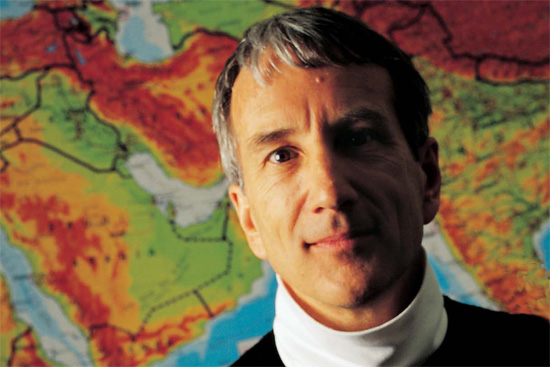Economics Professor Concerned with the Climate
 |
| Posted 11/02/05 |
| Gary Yohe, the John E. Andrus Professor of Economics, wasnt surprised to learn that Hurricanes Katrina and Wilma were churning in the Gulf of Mexico. But along with scientists across the globe, the economist was surprised by how quickly the storms intensified into catastrophic proportions.
The unpredictability of what these storms and global warmings possible effect on their intensity and increased frequency is what Yohe, a climate change economist, has been studying along with scientists for nearly 25 years. Climatologists, biologists, and climate modelers often collaborate with Yohe as they contemplate what could happen in certain scenarios. They take what economists like me give them and they produce climate scenarios and impact trajectories, says Yohe. Economists then take their products as inputs for vulnerability assessments. Last fall, Yohe co-authored a paper in the journal Science outlining a possible deterrent to global warming. The paper suggested attaching a tax on the carbon content (which generates the greenhouse gas carbon dioxide) in fossil fuels of $10 per ton (or about 5 cents per gallon of gasoline) and gradually increasing it each year. Yohe compares this possible tax increase to buying insurance against global warming. In economic terms its known as hedging – doing something that reduces the likelihood of an unpleasant outcome. He says that hedging global warming is like diversifying governments policy portfolios just like individuals diversify their financial portfolios. In no case is buying insurance like paying premiums into a pot from which you collect payment to cover a climate induced loss, he says. Instead, investments in hedging strategies are designed to reduce the anticipated cost of climate impacts. We need to accept that the climate is changing, perhaps increasing the intensity of hurricanes, for example, and make complementary investments in our capacity to adapt. Yohe will be sharing his research on how scientists may adapt to the ever-changing climate when he presents his findings in January to the Intergovernmental Panel of Climate Change (IPCC) the international gathering of natural and social scientists who routinely assess climate change. He and his fellow study authors hope to ultimately provide environmental policy-makers some insight into how they may intelligently voice their concerns about climate change. Yohe also hopes that his upcoming journal article in Climatic Change will help magnify the importance of integrating climate into development plans. He is currently collecting contributions from scientists who participated in the Aspen Global Change Institute workshop of Abrupt Climate Change last summer for the article. However, Yohe admits that it could be a while until we see any real action by policy-makers regarding global warming as the United States has withdrawn from discussions under the Kyoto Protocol. (An international agreement between more than 150 countries to help reduce greenhouse gas emissions that are suspected to be the cause of global warming). Still, Northeastern states have been joined by California and some Canadian provinces in an effort to reduce emissions in spite of Washington’s reluctance to proceed. Citizens of these states can work to support and to expand these efforts to manage climate risks in anticipation that, over the coming years, the threat of climate impacts, particularly abrupt impact of the sort observed in the Arctic over the past few years, becomes so clear that the federal government will follow their lead, explains Yohe. |
| By Laura Perillo, associate director of Media Relations |

